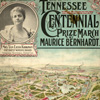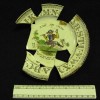
Making Music


Grand Concert by Morgan's Men Program. 1863. Tennessee State Library & Archives.
In the mid-nineteenth century, music played a central role in society. Patriotic songs and martial airs, often harking back to the American Revolution, accompanied almost every civic gathering. Work songs, which assuaged African American slaves doing backbreaking and tedious labor, began to make their way into religious gatherings held in secret brush arbors and river baptisms.
Music as parlor entertainment, usually played by the young ladies of the house, was a customary after-dinner activity, while community dances relied on fiddle music originating in the British Isles and passed down through folk tradition. For soldiers, marching to the beat of a fife and drum kept up the pace and helped make heavy-laden troop maneuvers across the southern landscape seem shorter.
Featured Music
Kittredge, Walter. “Tenting on the Old Camp Ground.” Abraham Lincoln Sings On! Performer, Jimerson, Douglas. Amerimusic, Inc., 1998. CD.
Tucker, Henry and Charles Carroll Sawyer. “Weeping Sad and Lonely.” The Civil War Music Collector’s Edition. Performer, The Hutchinson Family Singers and Judy Sjerven. Time-Life Music, 1991. CD.

Stories
Immediately after the Civil War, the Fisk Free School for African Americans was organized in Nashville to provide education for former slaves.
Brass bands playing patriotic tunes inspired young men to enlist for both the North and South.




